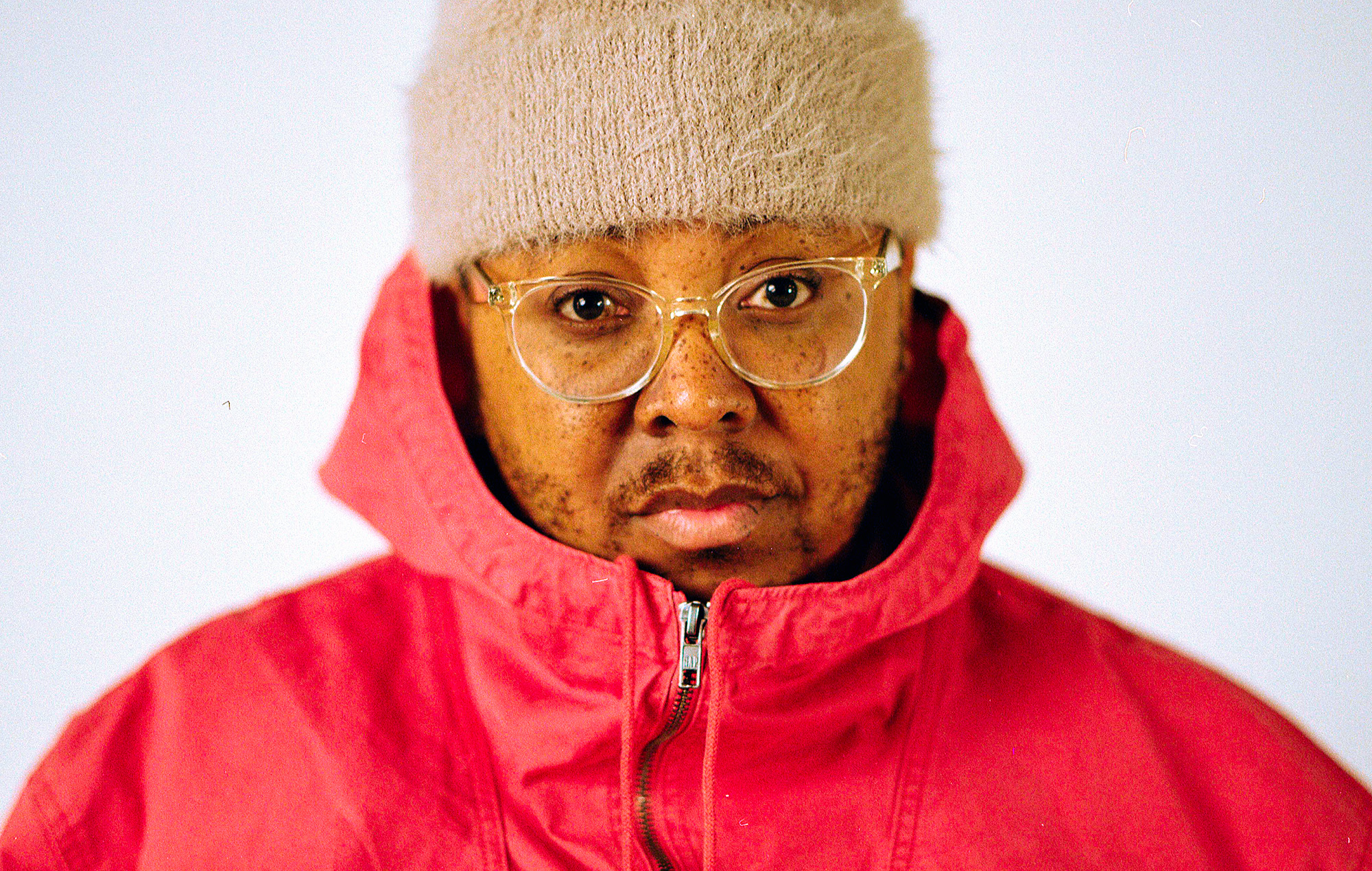Inside Birthdays, a clammy 200-cap bunker venue in Dalston, east London, Manga Saint Hilare is realising how his debut solo project ‘Outbursts From The Outskirts’ has connected with people. As his punchy multisyllabic bars are recited word-for-word, he conducts the crowd with skill, coaxing the room to crouch down low before launching himself into the pit for crowd favourite ‘Different Pattern’. It’s November 2017, and ‘Outbursts…’ has been out for several months. But before this moment, Manga didn’t understand its impact.
“That Birthdays show was crazy,” says the 38-year-old grime artist (real name Matthew Reid). “When I started performing and everyone knew the lyrics to the riddims, that was mad overwhelming. That was when I realised ‘I can do this.’”
Since then, Manga — who first rose to prominence in the early-mid ’00s with the grime crew Roll Deep alongside MCs like Wiley, Flowdan, and Scratchy — has harnessed that night’s momentum to become a crucial voice within the grime scene. Bolstered by experiences touring with DJ Target and Astroid Boys, when he “had to learn how to speak to people, how to have stuff that’s actionable”, he’s developed a dynamic live show, and dropped several acclaimed projects including ‘Make It Out Alive’ in 2020 and ‘Run For Your Life’ in 2022. He’s also been nominated for three MOBOs, and recently started hosting a BBC Radio 1Xtra show alongside Sian Anderson.
Credit: Press
Manga’s voice is defined by its openness; he regularly dissects his own insecurities, struggles with mental health, and personal relationships, showing a vulnerability that is rare within grime culture. This individuality has helped him establish himself as a key proponent of a UK sound that continues to rumble along, years after its mainstream explosion in the mid-2010s.
NME meets Manga in the smart, elaborately quirky café of a Kings Cross hotel, where overly attentive waiting staff bustle between leathery booths and co-working desks interspersed by shelves of academic books from the 1980s. This afternoon, he’s having a well-earned break from childcare duties (his long-term partner gave birth to their daughter nine months ago). Things are understandably a little hectic. But according to the title of Manga’s forthcoming album — which encapsulates his unique place in the scene by exploring themes of comfort, paranoia and fatherhood over a robust selection of beats blending filthy grime with key influences like UK jungle — ‘Everything Is Under Control’.
“Everything’s fast at the moment, and I ain’t really had time to think,” he says, perched on the edge of a cushioned armchair. “If I sat down and really started thinking about [fatherhood], I think it would scare me, but right now it’s just like ‘What’s her bedtime?’ But I’m cool; I fail so much, but I try. Before, I would mess up, but I’d be so unaware that I wouldn’t even notice until years later.”
This theme, personal growth, has been essential to his post-2017 solo rebirth. Manga Saint Hilare is a work in progress, and his lyrics regularly make that clear, from the hook of 2018 Frisco and JME collab ‘True To Me’ (“I felt like they were using me / I’m not the same person that I used to be”), to the confessional ‘Thoughts & Prayers’ bar “Self-love, I had to learn it / I had a few detours, now I’m determined”, and the pained, reflective ‘Outburst004’, which spits “I was tirelessly trying to find my tribe / Cause I don’t belong / I was looking for things that were right around me, all along”.
‘Everything Is Under Control’ continues on this course, arguably offering more self-reflection than any project since ‘Outbursts’. Critiquing the narrow-mindedness that sometimes accompanies artistry, on ‘Can’t Keep Getting Away With It’ he raps “I didn’t listen / Then I was wondering why I wasn’t winning / I couldn’t grow through those conditions”. Mingling with smooth-toned Leytonstone storyteller and longtime collaborator Murkage Dave on ‘It’s Okay To Open Up’, he rails against toxic masculinity, while documenting how opening up about his struggles with mental “demons” doesn’t always temper them.
This process of self-discovery didn’t fully begin until after the Roll Deep hype fizzled out following the commercial success of 2010 pop singles ‘Good Times’ and ‘Green Light’ (both reached Number One). The group had merged chart success with certified street anthems like ‘When I’m Ere’ and ‘Heat Up’, but it was a tough balancing act. Leading MCs like Wiley and Flowdan started focusing on solo endeavours, while DJ Target got a prime-time Radio 1Xtra show. At this point, Manga began thinking deeply about his own path.
“The ‘When I’m Ere’ video is the only reason I stayed in Roll Deep,” he says, reflecting on how he became synonymous with the influential grime crew, most of whom had grown up together around Bow, east London. “I grew up in northwest London, so I wasn’t even around them in east. I was just tryna be the best to help the team. But one day I thought ‘If I stop today, all they’re gonna say is ‘You were that brudda who made ‘When I’m Ere’,’ that’s it.’ I thought, ‘Nah, I’ve been here too long to just be remembered for that eight-bar.’”
Manga began working flat-out to improve his craft, spending 18-hour days alone in a Bethnal Green studio rented with Target and Flowdan, developing lyrics and flows, and building up his production skills. Moving away from the old Roll Deep studio in Limehouse was a game-changer — “I didn’t wanna start talking about my mum or my feelings with 30 man in the room!”, he laughs — and this period of self-exploration and enhanced creative freedom led him gradually toward the creation of ‘Outbursts’, which remains one of the best grime albums of the last decade. This is a significant achievement, not least because as Manga admits, it’s difficult to capture grime’s intense, collaborative, adrenaline-fuelled energy in a studio recording.
“Grime in its best form is a live set or a radio set,” he says. “That’s what makes grime better than everything to me, the fact that it’s different every time; we could have six people, two DJs, and we could do the same set 50 times, it’s gonna come back different every time.”
That being said, Manga is one grime artist who has consistently attempted to create cohesive projects. He starts with a title and uses this broad concept as a jumping-off point to explore different themes, subjects, and life events; the thread running through ‘Everything Is Under Control’ is a self-reflection process defined on the sparse, skittish jungle cut ‘Work In Progress’ as “find[ing] the comfort in uncomfortable”. Typically, one producer will be tasked with melding everything together, with the new record produced entirely by MoreNight, a UK beatmaker who according to Manga “can make anything to a super high level” — from the dense, muddy grime of ‘Kill Sound’ to the thumping, bassy amapiano of ‘U Be U’. The consistency this one producer model offers is crucial, especially given the former Roll Deep member’s lofty ambitions.
“Some people find it hard making projects, but I like to zoom out and see everything,” he says. “And I’ve always wanted to make a great grime album; high-level grime, like ‘Boy In Da Corner’ [Dizzee Rascal], ‘Konnichiwa’ [Skepta], ‘Playtime’s Over’ [Wiley], ‘Grime MC’ [JME]. To me, grime’s a culture, a feeling, and a mindset, rather than a BPM or a sound. I’m a grime artist, so everything I do is grime.”
20 years since Manga joined Roll Deep, he’s still finding new things to love about this distinctly UK culture. He continues to be driven by the spontaneity, the energy, and the collaboration that remains at grime music’s core. What makes him unique is his ability to blend this pure greaze with deeper subject matter, self-reflection and vulnerability.
“I think it’s important to look back sometimes,” he says. “But don’t do it with regret. I need to learn to appreciate the past a bit more, and tackle the things I find difficult. I’m still messing up, but I always seem to get enough grace to get to the next bit.”
‘Everything Is Under Control’ is released February 16 2024
The post The steady rise of Manga Saint Hilare, grime’s most loyal servant appeared first on NME.




